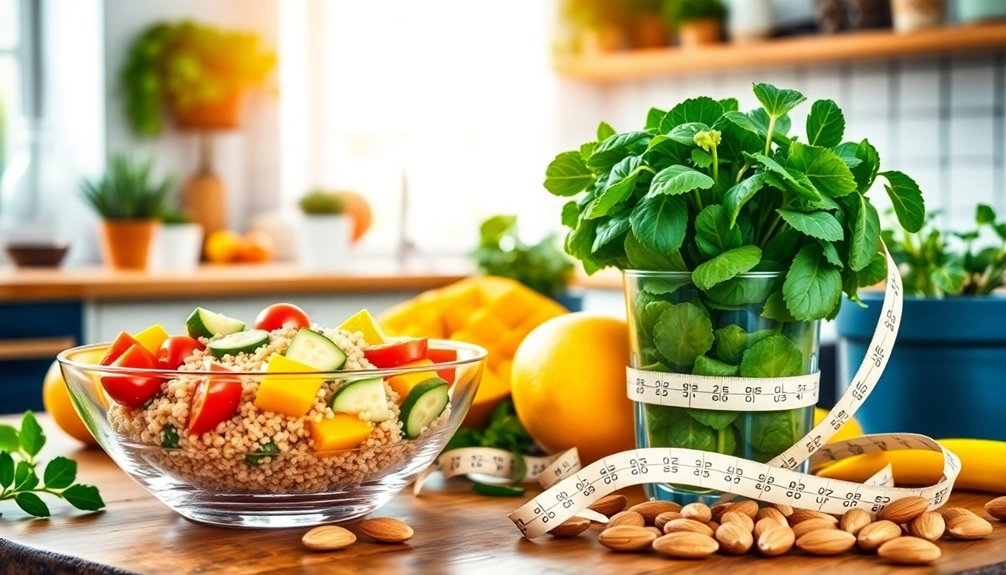A vegan diet can be an essential tool for weight loss. You'll find that high-fiber, low-calorie foods help you feel full, which aligns with studies showing lower body mass indexes in those following this diet. However, you might face challenges like dealing with cravings or limited dining options. It's important to make sure you get a variety of nutrients, including protein and vitamins, to avoid deficiencies. Organizing meals and practicing mindful eating will support your journey. If you're curious about strategies to navigate potential pitfalls and thrive on this path, there's more to explore on how to succeed with your vegan lifestyle.
Key Takeaways
- A vegan diet can support weight loss due to its lower calorie density and higher fiber content, promoting satiety.
- Vegans often have lower body mass indexes (BMIs) and reduced risk of chronic diseases, contributing to overall health benefits.
- Meal planning and variety are essential to ensure balanced nutrition and prevent nutrient deficiencies while following a vegan diet.
- Mindful eating practices help individuals tune into hunger cues, making it easier to manage cravings and maintain weight loss.
- Building a supportive community can provide motivation and accountability, enhancing long-term success in a vegan lifestyle.
Benefits of a Vegan Diet
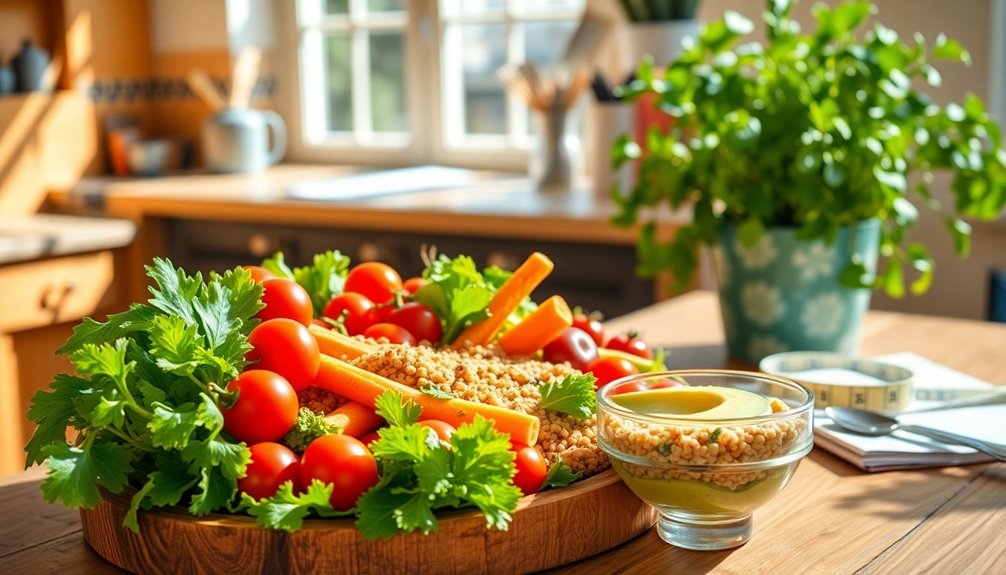
A vegan diet offers numerous benefits that can greatly enhance your overall health and support weight loss. By choosing plant-based foods, you typically consume fewer calories while still feeling full, which can help you shed those extra pounds. Research shows that people on vegan diets often have lower body mass indexes (BMIs) compared to those who consume animal products. This is largely due to the higher fiber content in fruits, vegetables, legumes, and whole grains, which keeps you satisfied longer and helps regulate your appetite.
In addition to aiding weight loss, a vegan diet provides significant health benefits. Studies indicate that vegans are at a lower risk for chronic diseases, such as heart disease, type 2 diabetes, and certain types of cancer. The abundance of antioxidants and phytonutrients found in plant foods can boost your immune system and promote overall wellness. You'll also likely see improvements in your cholesterol levels and blood pressure, which contribute to better heart health.
Incorporating a variety of colorful fruits and vegetables, whole grains, and legumes ensures that you're receiving the essential nutrients your body needs. This diverse range of foods not only supports your weight loss journey but also fosters a sense of belonging within the vibrant vegan community.
Common Challenges Faced
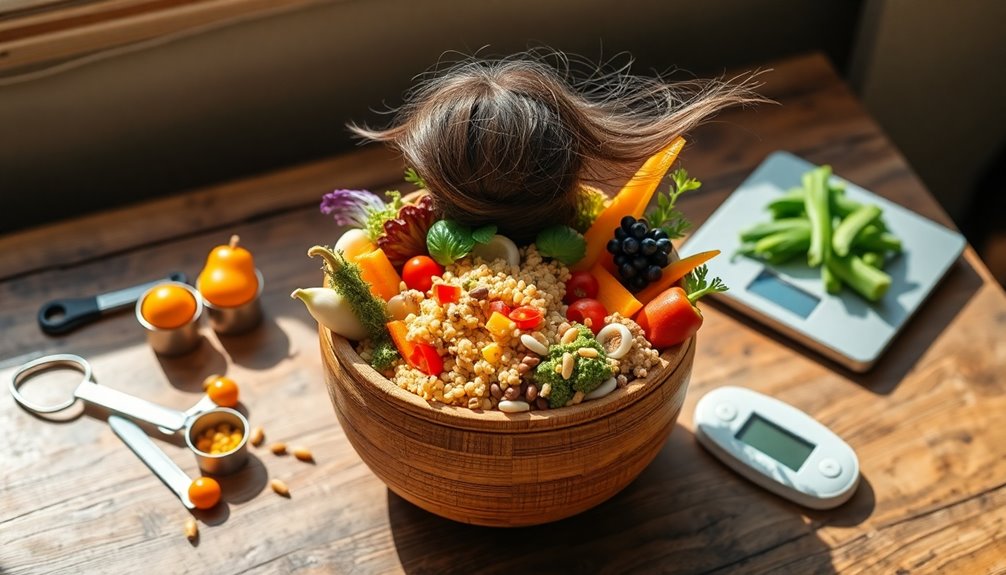
Switching to a vegan diet can present several challenges that might deter some individuals from fully embracing this lifestyle. One significant hurdle is handling social situations. Whether it's dining out with friends or attending family gatherings, you may find limited options available, making it challenging to stick to your diet. This can lead to feelings of exclusion or frustration, especially when everyone else seems to enjoy a variety of foods. Informing your friends and family about your dietary choices is crucial, encouraging them to accommodate your needs or even share vegan recipes to include everyone.
Another common challenge involves cravings and temptations. Adjusting to a vegan diet often means giving up familiar tastes and textures, which can trigger strong cravings for non-vegan foods. These temptations can be particularly overwhelming during stressful times or when faced with social pressures. Developing strategies to manage these cravings is vital, such as finding satisfying vegan alternatives or keeping healthy snacks on hand.
Moreover, you might experience a learning curve as you familiarize yourself with reading labels, cooking new dishes, and understanding plant-based nutrition. This process can be intimidating, but it's also an opportunity to expand your culinary repertoire and discover delicious new foods. Remember, it's normal to face challenges when making such a significant lifestyle change.
Surrounding yourself with a supportive community can help you handle these obstacles and stay committed to your goals.
Nutritional Considerations
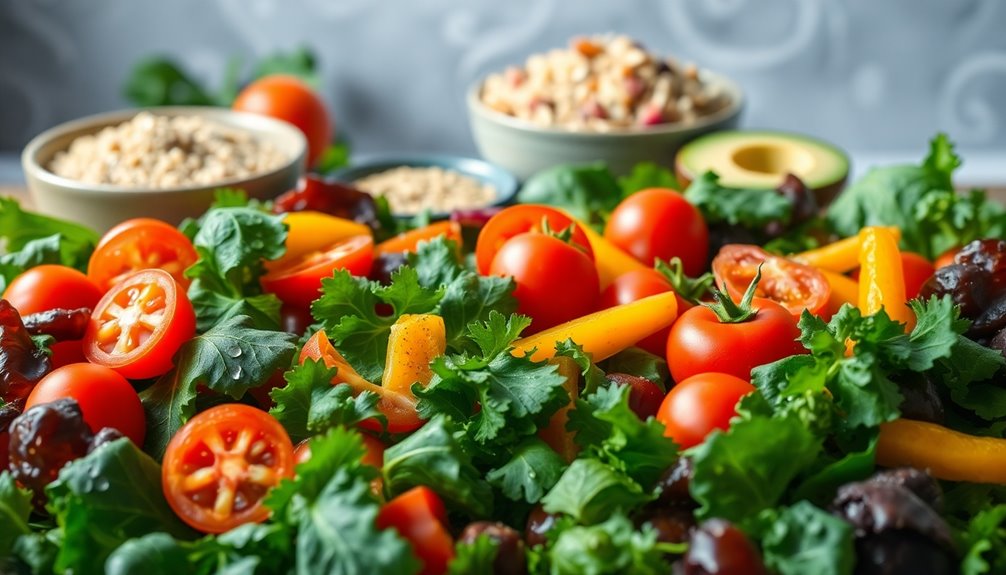
Understanding the nutritional aspects of a vegan diet is necessary for achieving weight loss and maintaining overall health. When you embrace a vegan lifestyle, you'll discover a world of plant-based foods that offer numerous health benefits. However, it's vital to make sure you're meeting your body's nutritional needs.
One of the primary concerns for those on a vegan diet is finding sufficient protein sources. Unlike animal products, many plant-based proteins are incomplete, meaning they lack one or more essential amino acids. To address this, vary your protein intake by including a variety of legumes, nuts, seeds, and whole grains.
Mixing foods like rice and beans or hummus with whole-grain pita can help you achieve a complete amino acid profile.
Another significant aspect to keep in mind is the risk of vitamin deficiencies. While a vegan diet is rich in many nutrients, it may lack certain vitamins such as B12, iron, and omega-3 fatty acids.
Vitamin B12 is primarily found in animal products, so it's crucial to explore fortified foods or supplements. Additionally, iron from plant sources is less easily absorbed, so pairing it with vitamin C-rich foods can improve absorption.
For omega-3s, consider incorporating flaxseeds, chia seeds, and walnuts.
Meal Planning Tips
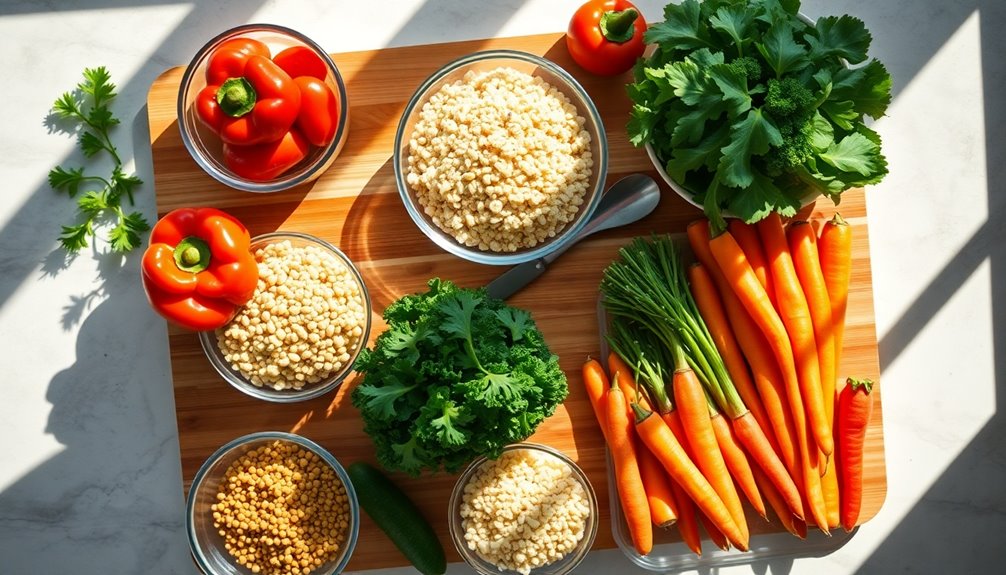
Meal planning plays a significant role in successfully managing a vegan diet while supporting weight loss goals. By taking the time to organize your meals, you can guarantee that you're consuming a variety of nutritious foods that keep you satisfied and energized. Start by dedicating a day each week for grocery shopping and meal prep. This way, you can avoid the temptation of unhealthy convenience foods.
When you're planning your meals, think about incorporating an array of fruits, vegetables, whole grains, legumes, nuts, and seeds. These foods aren't only rich in nutrients but also help you feel full longer. Consider creating a weekly menu that includes breakfast, lunch, dinner, and snacks. This will help you avoid last-minute decisions that may lead to less healthy choices.
You might find it helpful to gather a list of go-to recipe ideas. Try experimenting with different cuisines to keep things exciting—think hearty bean chili, colorful vegetable stir-fries, or flavorful quinoa salads. Batch cooking can also be a game-changer; prepare larger portions and store them in the fridge or freezer for easy access throughout the week.
Lastly, don't forget to adjust your meal plans based on seasonal produce to save money and enhance flavor. Remember, the key is finding what works for you, so feel free to tweak your plans as you learn more about your preferences and needs. By staying organized, you'll not only reach your weight loss goals but also enjoy the journey.
Long-Term Success Strategies
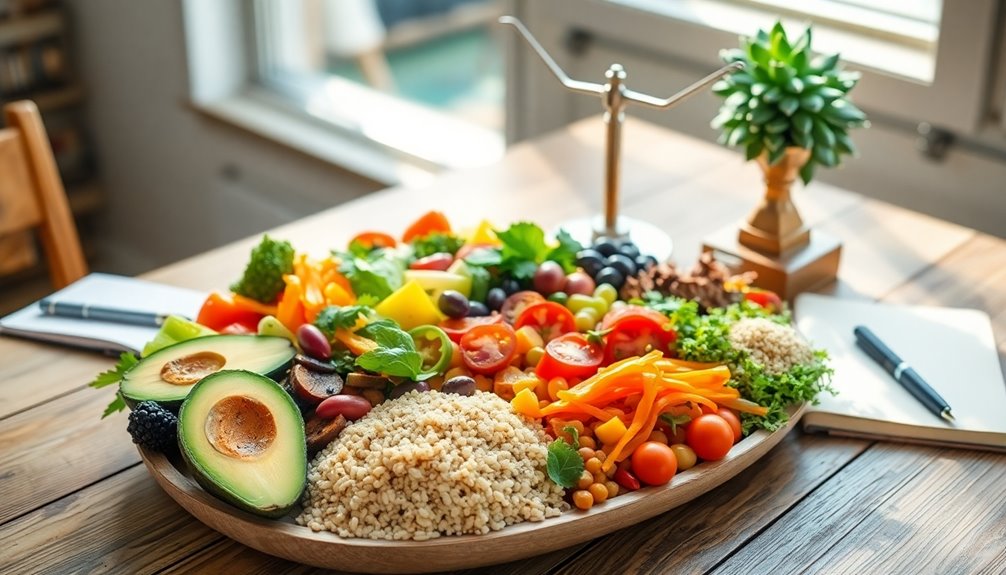
While adopting a vegan diet can be an effective way to shed pounds, sustaining that progress over the long term requires a strategic approach. One of the most important strategies is practicing mindful eating. This means tuning into your body's hunger and fullness cues, which helps you make better food choices and avoid emotional eating. By being present at mealtime, you'll likely find greater satisfaction in smaller portions, keeping you aligned with your weight loss goals.
Additionally, integrating a consistent exercise routine into your lifestyle is vital. Regular physical activity not only burns calories but also boosts your mood and energy levels. Aim for a mix of cardiovascular exercises, strength training, and flexibility workouts. This balanced approach keeps your routine engaging and supports overall health, making it easier to maintain your weight loss in the long run.
Another key to long-term success is building a supportive community. Surround yourself with like-minded individuals who share your dietary goals. Join vegan groups, online forums, or local meet-ups. Sharing experiences and tips can provide motivation and accountability, enhancing your commitment to a vegan lifestyle.
Frequently Asked Questions
Can I Lose Weight on a Vegan Diet Without Exercising?
Yes, you can lose weight on a vegan diet without exercising, but it'll require careful meal planning. Focus on whole, nutrient-dense foods while monitoring your caloric intake. Incorporating nutritional supplements can help guarantee you're meeting your dietary needs, particularly for protein and vitamins.
How Quickly Can I Expect to See Weight Loss Results?
You might think weight loss happens overnight, but it usually takes time. Expect to see results within a few weeks if you stay consistent. However, consistency challenges can arise, and addressing them is crucial to avoid hitting a plateau.
Are There Any Specific Vegan Foods That Boost Weight Loss?
If you're looking to boost weight loss on a vegan diet, focus on superfoods like quinoa, lentils, and chia seeds. These not only provide essential nutrients but also vegan protein, which helps you feel fuller longer. Incorporating leafy greens like kale and spinach can also aid in weight loss due to their low calorie content and high fiber. Remember, a balanced approach with plenty of variety will support your goals effectively.
Will I Feel Hungry on a Vegan Weight Loss Diet?
You might feel hungry on a vegan weight loss diet if you don't focus on managing cravings and meal planning. Incorporating high-fiber foods like legumes, whole grains, and vegetables can help you stay full longer. Planning your meals in advance can guarantee you have satisfying options that meet your nutritional needs.
Is a Vegan Diet Safe for Everyone When Trying to Lose Weight?
Imagine sailing a vast ocean, where each wave represents a different dietary choice.
A vegan diet can be safe for many, but it's crucial to chart your course carefully. You'll want to address health concerns and guarantee nutritional balance.
Not everyone's body responds the same way, so listen to yours and seek advice from a healthcare professional if you're unsure.
With the right guidance, you can cruise smoothly toward your weight loss goals while feeling nourished.
Conclusion
As you start on your vegan journey for weight loss, envision a vibrant plate bursting with fruits, vegetables, and whole grains. This colorful palette not only nourishes your body but also supports your weight loss goals. While challenges may arise, remember that the benefits—improved health and increased energy—are well worth the effort. Stay committed, plan your meals thoughtfully, and embrace the lifestyle change; you'll find that long-term success is within your reach.

